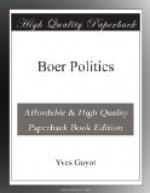[Footnote 18: Published in the Revue Sud-Africaine (Paris).]
2.—A Local Board.
The report made by Mr. Rouliot to the Chamber of Mines on January 20th, 1898, refers to the burdens imposed upon the gold industry by the faulty administration of the Transvaal. It shows how the Volksraad contemptuously rejected, in 1897, a petition signed by more than ten thousand inhabitants of all nationalities and all professions. It declares that “the Chamber of Mines has no desire to interfere in the conduct of general affairs in the Transvaal”; it recalls the fact that the Commission of Enquiry nominated after the Crisis of 1896, had recommended the constitution of a “Local Board” which President Krueger had contemptuously rejected; and goes on to say:—
“It is nonsense to affirm that the creation of such a Board would have made a government within a government, and would have threatened the independence of the State. At the time that we made the proposal, we sincerely trusted that what had happened might be buried in oblivion and that we might dwell together in amity. We had hoped that the burghers would have recognised that want of experience, and their education would have made them unfitted for dealing with the most difficult problems that could face a young nation, and that they would have seen the necessity of calling men to their aid who could give them the benefit of their experience, and help them to ensure sound conditions for the State and its industrial development. Unfortunately, we have been deceived in our hopes....”
That is all; save that Mr. Rouliot alludes cursorily to the fact that the government had endeavoured to found a Chamber of Mines in opposition to the old one, but that an amalgamation had taken place; he, consequently, was speaking in the name of the entire industry.
3.—A Deliberative Council.
In the course of the year 1898, Mr. Krueger’s policy became more and more provocative. The Chamber of Mines confined itself to the request for the appointment of a deliberative council, to be composed of members nominated by the government, the powers of which should be limited to the application of the laws concerning gold-theft, the sale of spirituous liquors, and the “pass-law” concerning native labourers.
At a meeting of the Volksraad, June, 1898, the sub-committee appointed to enquire into this modest request, decided to recommend its rejection. Mr. A.D. Wolmarans said that “the council would be the means of placing over the heads of the agents of the State, a commission whose members were not in possession of the franchise; and that the Volksraad would practically be adopting the proposition of home rule, and autonomy, put forward by Mr. Chamberlain in 1896.”
On September 12th, the question was revived. A member of the Volksraad, named Lombaard, said that: “Johannesburg would never be satisfied until it had a little government of its own”; and that, as for the sale of liquor, as far as he was concerned, he saw no reason why Kaffirs should not drink themselves to death, if such was their taste.




